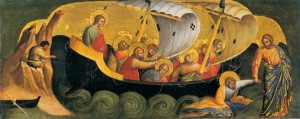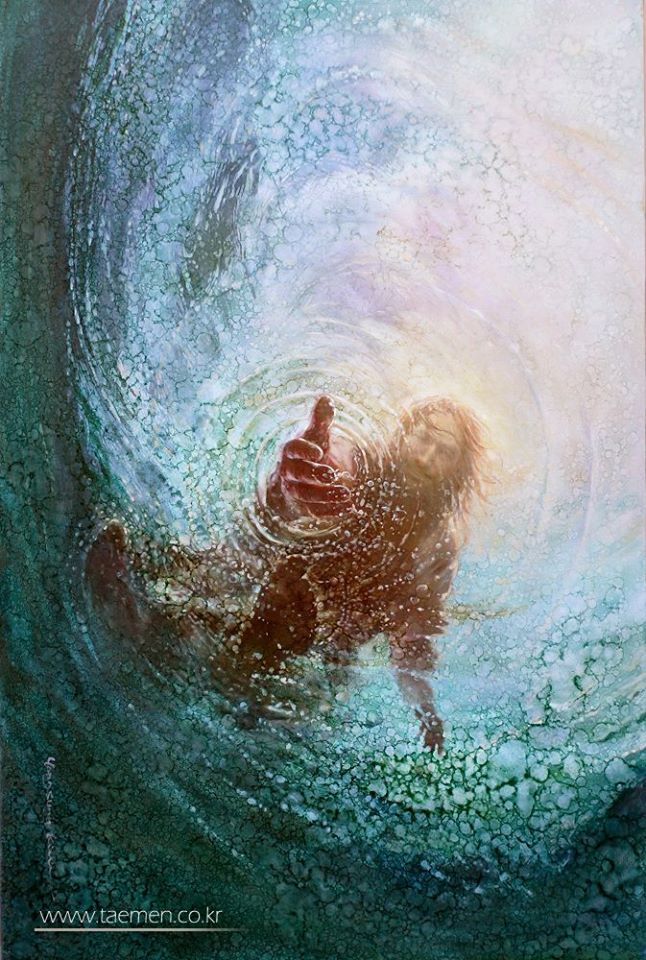
Central idea: Christ’s prayer to the Father. Doctrine: The prayer of Jesus and Mary. Practical application: Important norms for our own life of prayer.
To view Lectionary 115, click here.
Central Idea: Christ’s prayer to the Father
Reading 1 1 Kgs 19:9a, 11-13a
At the mountain of God, Horeb,
Elijah came to a cave where he took shelter.
Then the LORD said to him,
“Go outside and stand on the mountain before the LORD;
the LORD will be passing by.”
A strong and heavy wind was rending the mountains
and crushing rocks before the LORD—
but the LORD was not in the wind.
After the wind there was an earthquake—
but the LORD was not in the earthquake.
After the earthquake there was fire—
but the LORD was not in the fire.
After the fire there was a tiny whispering sound.
When he heard this,
Elijah hid his face in his cloak
and went and stood at the entrance of the cave.
- Horeb or Sinai is the mountain where Moses also spoke to God.
- Elijah has been driven here by his own people who rejected the LORD and embraced idolatry.
- When God revealed himself to Elijah, it was through “a tiny whispering sound.”
- A lesson for us in our life of prayer is that we should not expect God to reveal himself to us or to answer us dramatically (but if he does, so much the better!). Rather, the normal way to hear him is to listen carefully for “words” that are gentle, non-coercive, and do not contradict the moral law.
- God’s quiet words should be asking us to do something good: acts of kindness, truth, justice, and so on, as the Psalm indicates. (For example, “God proclaims . . . peace.”)
Responsorial Psalm
R. Lord, let us see your kindness, and grant us your salvation.
I will hear what God proclaims;
the LORD — for he proclaims peace.
Near indeed is his salvation to those who fear him,
glory dwelling in our land.Kindness and truth shall meet;
justice and peace shall kiss.
Truth shall spring out of the earth,
and justice shall look down from heaven.The LORD himself will give his benefits;
our land shall yield its increase.
Justice shall walk before him,
and prepare the way of his steps.
- This psalm speaks of the Incarnation of Christ. The person of Christ is our peace. He came near to us. He was God’s glory dwelling in our land. He embodies in himself kindness, truth, justice, and peace. Through him, God himself gave us his benefits.
- In the time of the Psalmist it was understood that the LORD could be near to those who tried to be near to him. As the Chosen People, the Jews could be near to the LORD.
- The same is even more true for us through Baptism. We live now in the condition of anticipating heavenly happiness. Heaven is not just something for the future but can be experienced in a limited way now. This heaven now is living in communion with Christ and his family the Church.
Reading 2 Rom 9:1-5
Brothers and sisters:
I speak the truth in Christ, I do not lie;
my conscience joins with the Holy Spirit in bearing me witness
that I have great sorrow and constant anguish in my heart.
For I could wish that I myself were accursed and cut off from Christ
for the sake of my own people,
my kindred according to the flesh.
They are Israelites;
theirs the adoption, the glory, the covenants,
the giving of the law, the worship, and the promises;
theirs the patriarchs, and from them,
according to the flesh, is the Christ,
who is over all, God blessed forever. Amen.
- Paul was a Jew by birth and a Christian by Christ’s personal calling.
- He desires his own people’s conversion to Christ so much that he is willing to be damned himself (“accursed and cut off from Christ”) for their sake, meaning for their conversion.
- He also provides a catalogue of reasons why we should always admire the Jewish religion, first for what God gave them and then for what God gave us through them: “from them, according to the flesh, is the Christ, who is over all, God blessed forever.”
Gospel Mt 14:22-33
After he had fed the people, Jesus made the disciples get into a boat
and precede him to the other side,
while he dismissed the crowds.
After doing so, he went up on the mountain by himself to pray.
When it was evening he was there alone.
Meanwhile the boat, already a few miles offshore,
was being tossed about by the waves, for the wind was against it.
During the fourth watch of the night,
he came toward them walking on the sea.
When the disciples saw him walking on the sea they were terrified.
“It is a ghost,” they said, and they cried out in fear.
At once Jesus spoke to them, “Take courage, it is I; do not be afraid.”
Peter said to him in reply,
“Lord, if it is you, command me to come to you on the water.”
He said, “Come.”
Peter got out of the boat and began to walk on the water toward Jesus.
But when he saw how strong the wind was he became frightened;
and, beginning to sink, he cried out, “Lord, save me!”
Immediately Jesus stretched out his hand and caught Peter,
and said to him, “O you of little faith, why did you doubt?”
After they got into the boat, the wind died down.
Those who were in the boat did him homage, saying,
“Truly, you are the Son of God.”
- Our Lord wanted to be by himself to pray and he finally got the chance after sending the disciples ahead and dismissing the crowds himself.
- Like Moses and Elijah on Sinai, Christ “went up on the mountain by himself to pray.” Later, these two Old Testament prophets will appear with Christ on the mountain of the Transfiguration to speak of Jesus’ “exodus.”
- We wonder what Jesus said and what the Father answered. We don’t know, but we can imitate Christ. We can go by ourselves to pray. If we do, we will know what we will say to the Father and we will know what the Father answers. As was the case with Elijah, we should listen carefully.
- Our own Horeb will be someplace we can be alone: “But when you pray, go into your room and shut the door and pray to your Father who is in secret; and your Father who sees in secret will reward you (Mt 6:6).
- Christ shows his complete mastery over nature by walking on water. It is hard to imagine a reason that any of us would need to walk on water but we do need to carry out God’s will with (sometimes) heroic faith. God may ask us to do something we are afraid to do, because it seems beyond our powers, and so we don’t do it. Or, we start to do it and then feel overwhelmed and cry out, “Lord, save me.” God is much more pleased by that seeming failure than the one that results from doing nothing. Still, he rebukes us a little: “O you of little faith, why did you doubt?”
- In heaven, we will enjoy mastery over nature. In asking Christ to call him to walk with him on the water, Peter was asking to enjoy heaven now. Christ agreed and said, “Come.”
Doctrine: The prayer of Jesus and Mary
- Jesus “went up on the mountain by himself to pray.” Jesus’ prayer to the Father “is the perfect model of prayer in the New Testament. Often done in solitude and in secret,” as we see in today’s Gospel, “the prayer of Jesus involves a loving adherence to the will of the Father even to the Cross and an absolute confidence in being heard.” (CCC 2620)
- “In his teaching, Jesus teaches his disciples to pray with a purified heart, with lively and persevering faith, with filial boldness. He calls them to vigilance and invites them to present their petitions to God in his name. Jesus Christ himself answers prayers addressed to him.” (CCC 2621)
- “The prayers of the Virgin Mary, in her Fiat and Magnificat, are characterized by the generous offering of her whole being in faith” (CCC 2622).
- Mary’s Fiat refers to her let it be done to God’s will as revealed to her by the angel Gabriel.
- Mary’s Magnificat was her extravagant Holy Spirit inspired praise of what God was doing to her and through her.
Practical Application: Important norms for our own life of prayer
- While the Mass is the perfect prayer, we also need to have a private life of prayer, a daily and intimate conversation with God. Heaven is communion with God and one way to begin this communion now is by the conversation of prayer. “Commune with your own hearts on your beds, and be silent” (Ps 4:4).
- As was the case with Christ and his mother, the heart of prayer is offering oneself in “loving adherence to the will of the Father,” regardless of the cost. “My Father, if it be possible, let this cup pass from me; nevertheless, not as I will, but as thou wilt” (Mt 26:39). “And Mary said, “Behold, I am the handmaid of the Lord; let it be to me according to your word” (Lk 1:38).
- In imitation of Christ our Master, we also have to have the confidence of faith that God will answer our prayers. So we pray with faith. “And Jesus lifted up his eyes and said, ‘Father, I thank thee that thou hast heard me. I knew that thou hearest me always, but I have said this on account of the people standing by, that they may believe that thou didst send me’” (Jn 11: 41-42).
- We cannot expect our life of prayer to mean anything without an on-going conversion of heart. If we don’t work with God to purify our lives of sin, we can’t expect a life of prayer. “The time is fulfilled, and the kingdom of God is at hand; repent, and believe in the gospel” (Mt. 1:15).
- We can also pray with “filial boldness” or the audacity of a loved child. We can ask for what we want, so long as it is not evil. “If you then, who are evil, know how to give good gifts to your children, how much more will the heavenly Father give the Holy Spirit to those who ask him!” (Lk 11:13).
- We pray to the Father through Christ and directly to Christ. Christ “invites [his disciples] to present their petitions to God in his name. Jesus Christ himself answers prayers addressed to him” (CCC 2621).
- To be vigilant means to be on watch. We are vigilant if we say to Our Lord, I will pray at this time every day and I will pray in these ways every day, and then actually do it.
- We can find the solitude Elijah and Christ sought and that Christ recommends for us anytime we want by entering into our own interiority—even if things are busy and noisy around us. However, the best place for prayer is before the Blessed Sacrament in a quiet Church.
The Homiletic Directory also recommends the following Catechism points and themes for the Nineteenth Sunday in Ordinary Time”
- CCC 164: faith experiences testing
- CCC 272-274: only faith can follow mysterious ways of providence
- CCC 671-672: in difficult times, cultivate trust that all is subject to Christ
- CCC 56-64, 121-122, 218-219: history of covenants; God’s love for Israel
- CCC 839-840: the Church’s relationship to the Jewish people

Leave a Reply